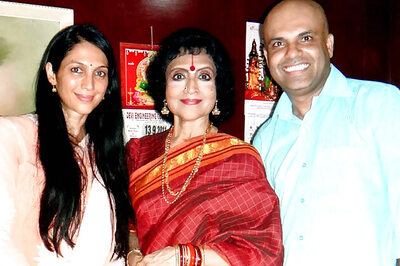
views
The World Thalassaemia Day or International Thalassaemia Day is celebrated every year on 8 May to commemorate victims of the disease. Bollywood celebrities also took a step towards spreading awareness on their social media handles in support of the #AadhiwaliZindagiMitao movement.
Thalassaemia is a blood-related genetic disorder involving the absence of or errors in genes responsible for the production of haemoglobin, a protein present in the red blood cells, according to the World Health Organisation.
Hrithik Roshan, Abhishek Bachchan, Farah Khan, Anil Kapoor, Arjun Kapoor, Sonakshi Sinha, Huma Qureshi, Kunal Kapoor and Ayushmann Khurrana posted a picture of their half faces, sharing a common message along with it.
The message read, "Did you know that when both husband and wife have Thalassemia Minor, there is a 25% chance that their child will have Thalassemia Major and reduced life expectancy?
Today, on #WorldThalassemiaDay, by posting this picture of half my face, I am supporting the #AadhiwaliZindagiMitao movement to remind everyone to get tested for Thalassemia and prevent giving their child half a life. Visit www.thewishingfactory.org or call 844-844-9544 to schedule a Thalassemia test and to donate to help patients."
They also nominated three of their other friends to post a cropped picture of their face and post the same message while nominating three others.
Today, on #WorldThalassemiaDay, by posting this picture of half my face, I’m supporting #AadhiwaliZindagiMitao by @_TWFofficial to remind people to get tested for Thalassemia & prevent giving their child half a life. pic.twitter.com/WfJnJmvTJg— Hrithik Roshan (@iHrithik) May 8, 2019
The disease has wide-ranging effects on the human body like iron overload, bone deformities and can even cause heart disease in severe cases. Thalassaemia has no cure and patients require regular blood transfusions as an effective measure to prolong life. The severity of the disease depends on the mutations involved in the genes and their interplay. The alpha and beta thalassaemias are the most common inherited single-gene disorders in the world. India is one of the worst- affected countries with more than four crore thalassemia carriers and over one lakh thalassaemia majors under blood transfusion every month.
Over one lakh thalassemia patients across the country die before they turn 20 due to lack of access to treatment.
Why Thalassaemia screening is important before marriage?
Every year more than 10,000 children with thalassaemia major are born in India and thalassaemia patients are unknowingly passing on the genetic disorder to their children. Experts reckon the trend can be curbed if couples undergo thalassaemia screening before marriage. According to a study published in the International Journal of Medical Science & Public Health, in India, the most prevalent hemoglobinopathies are thalassemia and sickle cell anaemia.
To reduce the burden of highly prevalent monogenic disorders, the study proposes, it is essential that disease progression is halted at the carrier stage.
When two such thalassaemia carriers marry and plan to have children there is a one-in-four chance of having a thalassaemic baby at every conception.
A simple blood test for thalassaemia before marriage will let couples know if they are carriers or not. If both are non-carriers, they need not worry. But if both are carriers, they may either decide not to have any children or go for a test called amniocentesis within the first 12 weeks of pregnancy to detect if the child is affected or not.



















Comments
0 comment